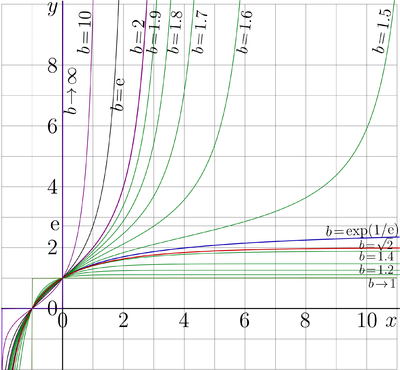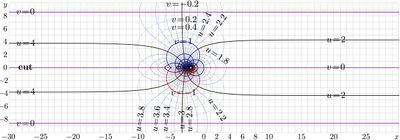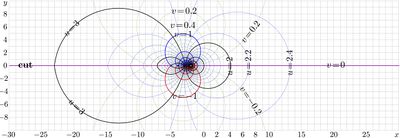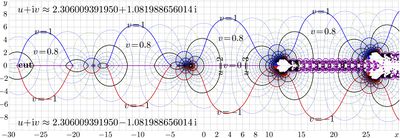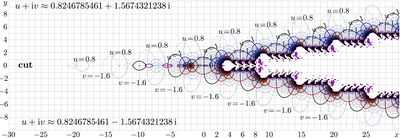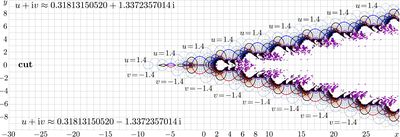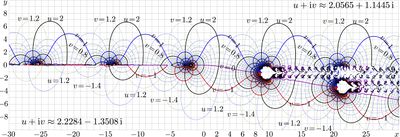Difference between revisions of "Maps of tetration"
| (One intermediate revision by the same user not shown) | |||
| Line 1: | Line 1: | ||
| − | [[File:Tetreal10bx10d.png|400px|thumb| |
+ | [[File:Tetreal10bx10d.png|400px|thumb|\(y\!=\!\mathrm{tet}_b(x)\) versus \(x\) for various \(b\)]] |
| − | [[File:Ack3a600.jpg|400px|thumb|Base |
+ | [[File:Ack3a600.jpg|400px|thumb|Base \(b=\sqrt{2}\approx 1.41\)]] |
| − | [[File:Ack3b600.jpg|400px|thumb|Henryk base, |
+ | [[File:Ack3b600.jpg|400px|thumb|Henryk base, \(b=\exp(1/\mathrm e)\approx 1.44\)]] |
| − | [[File:Ack3c600.jpg|400px|thumb|Base |
+ | [[File:Ack3c600.jpg|400px|thumb|Base \(b=1.5\)]] |
| − | [[File:Ack4a600.jpg|400px|thumb|Binary tetration, |
+ | [[File:Ack4a600.jpg|400px|thumb|Binary tetration, \(b=2\)]] |
| − | [[File:Ack4b600.jpg|400px|thumb|Natural base, |
+ | [[File:Ack4b600.jpg|400px|thumb|Natural base, \(b=\mathrm e \approx 2.71\)]] |
| − | [[File:Ack4c.jpg|400px|thumb|Sheldon base, |
+ | [[File:Ack4c.jpg|400px|thumb|Sheldon base, \(b=1.52598338517+0.0178411853321 \,\mathrm i\)]] |
| − | Article [[Maps of tetration]] collects some [[complex map]]s of [[tetration]] |
+ | Article [[Maps of tetration]] collects some [[complex map]]s of [[tetration]] \(\mathrm{tet}_b\) to different values of base \(b\). |
| − | For real values of base |
+ | For real values of base \(b\), the real-real plots \(y\!=\!\mathrm{tet}_b(x)\) are shown in the upper figure at right. |
At the complex maps, the following cases are represented: |
At the complex maps, the following cases are represented: |
||
<poem> |
<poem> |
||
| − | + | \(b=\sqrt{2} \approx 1.41\) |
|
| − | + | \(b=\exp(1/\mathrm e) \approx 1.44\) |
|
| − | + | \(b=1.5\) |
|
| − | + | \(b=2\) |
|
| − | + | \(b=\mathrm e \approx 2.71\) |
|
| − | + | \(b=1.52598338517+0.0178411853321 \,\mathrm i\) |
|
</poem> |
</poem> |
||
| − | Tetration is shown with lines of constant real part |
+ | Tetration is shown with lines of constant real part \(u\) and lines of constant imaginary part \(v\); |
| − | + | \(u\!+\!\mathrm i v=\mathrm {tet}_b(x\!+\!\mathrm i y)\) |
|
| − | == |
+ | ==\(b=\sqrt{2}\)== |
| − | For this case, the regular iteration at [[fixed point]] |
+ | For this case, the regular iteration at [[fixed point]] \(L=2\) is used. |
The evaluation is described in the [[Mathematics of Computation]] |
The evaluation is described in the [[Mathematics of Computation]] |
||
<ref> |
<ref> |
||
| Line 33: | Line 33: | ||
</ref>. |
</ref>. |
||
| − | == |
+ | ==\(b=\exp(1/\mathrm e)\approx 1.44\)== |
| − | For |
+ | For \(b=\exp(1/\mathrm e)\approx 1.44\), the exotic iteration at [[fixed point]] \(L=\mathrm e\approx 2.71\) is used. |
The evaluation is described in the [[Mathematics of Computation]] |
The evaluation is described in the [[Mathematics of Computation]] |
||
<ref> |
<ref> |
||
| Line 44: | Line 44: | ||
</ref>. |
</ref>. |
||
| − | == |
+ | ==\(b>\exp(1/\mathrm e)\)== |
| − | For |
+ | For \(b>\exp(1/\mathrm e)\approx 1.44\), the |
[[Cauchi integral]] is used for evaluation. It is described in [[Mathematics of Computation]] |
[[Cauchi integral]] is used for evaluation. It is described in [[Mathematics of Computation]] |
||
<ref name=analuxp> |
<ref name=analuxp> |
||
| Line 55: | Line 55: | ||
</ref>. |
</ref>. |
||
| − | Historically, evaluation for the case |
+ | Historically, evaluation for the case \(b=\mathrm e\) was first to be reported. |
Namely for this case, the special algorithm [[fsexp.cin]] is loaded; it is described in [[Vladikavkaz Mathematical Jorunal]] |
Namely for this case, the special algorithm [[fsexp.cin]] is loaded; it is described in [[Vladikavkaz Mathematical Jorunal]] |
||
<ref name=vladie> |
<ref name=vladie> |
||
| Line 62: | Line 62: | ||
</ref>. |
</ref>. |
||
| − | ==Sheldon base |
+ | ==Sheldon base \(b=1.52598338517+0.0178411853321\,\mathrm i.\) == |
| − | Tetration to Sheldon base |
+ | Tetration to Sheldon base \(b\!=\!1.52598338517\!+\!0.0178411853321\mathrm i\) |
is considered by the special request from [[Sheldon Levenstein]]. |
is considered by the special request from [[Sheldon Levenstein]]. |
||
For this base, tetration was believed to be especially difficult to evaluate. |
For this base, tetration was believed to be especially difficult to evaluate. |
||
| Line 74: | Line 74: | ||
</ref>. |
</ref>. |
||
| − | The small modification had been applied to the original algorithm; the condition |
+ | The small modification had been applied to the original algorithm; the condition \(F(z^*)=F(z)^*\) is suppressed at the numerical solving of the corresponding integral equation for values o superfunction along \(\Im(z)=\mathrm{const}\). No difficulties, specific namely for this complex value of base \(b\), had been revealed. |
==Book== |
==Book== |
||
| Line 97: | Line 97: | ||
==Keywords== |
==Keywords== |
||
| − | [[Ackermann]] |
+ | [[Ackermann]], |
| − | [[Complex map]] |
+ | [[Complex map]], |
| − | [[ |
+ | [[Superfunction]], |
| + | [[Superfunctions]], |
||
| + | [[Tetration]], |
||
[[Category:Ackermann]] |
[[Category:Ackermann]] |
||
Latest revision as of 12:00, 21 July 2020
Article Maps of tetration collects some complex maps of tetration \(\mathrm{tet}_b\) to different values of base \(b\).
For real values of base \(b\), the real-real plots \(y\!=\!\mathrm{tet}_b(x)\) are shown in the upper figure at right.
At the complex maps, the following cases are represented:
\(b=\sqrt{2} \approx 1.41\)
\(b=\exp(1/\mathrm e) \approx 1.44\)
\(b=1.5\)
\(b=2\)
\(b=\mathrm e \approx 2.71\)
\(b=1.52598338517+0.0178411853321 \,\mathrm i\)
Tetration is shown with lines of constant real part \(u\) and lines of constant imaginary part \(v\); \(u\!+\!\mathrm i v=\mathrm {tet}_b(x\!+\!\mathrm i y)\)
\(b=\sqrt{2}\)
For this case, the regular iteration at fixed point \(L=2\) is used. The evaluation is described in the Mathematics of Computation [1].
\(b=\exp(1/\mathrm e)\approx 1.44\)
For \(b=\exp(1/\mathrm e)\approx 1.44\), the exotic iteration at fixed point \(L=\mathrm e\approx 2.71\) is used. The evaluation is described in the Mathematics of Computation [2].
\(b>\exp(1/\mathrm e)\)
For \(b>\exp(1/\mathrm e)\approx 1.44\), the Cauchi integral is used for evaluation. It is described in Mathematics of Computation [3].
Historically, evaluation for the case \(b=\mathrm e\) was first to be reported. Namely for this case, the special algorithm fsexp.cin is loaded; it is described in Vladikavkaz Mathematical Jorunal [4].
Sheldon base \(b=1.52598338517+0.0178411853321\,\mathrm i.\)
Tetration to Sheldon base \(b\!=\!1.52598338517\!+\!0.0178411853321\mathrm i\) is considered by the special request from Sheldon Levenstein. For this base, tetration was believed to be especially difficult to evaluate.
The evaluation uses almost the same algorithm of the Cauchi integral [3].
The small modification had been applied to the original algorithm; the condition \(F(z^*)=F(z)^*\) is suppressed at the numerical solving of the corresponding integral equation for values o superfunction along \(\Im(z)=\mathrm{const}\). No difficulties, specific namely for this complex value of base \(b\), had been revealed.
Book
The maps are plotted using the conto.cin code in C++. The Latex code is used to add the labels. All the maps at right are supplied with generators; the colleagues may download the code and reproduce them. If some generator does not work as expected, let me know and let us correct it.
The algorithms, used to evaluate the tetration, are described in the Book Суперфункции, in Russian [5].
For year 2014, the English version is not yet ready.
References
- ↑
http://www.ams.org/journals/mcom/2010-79-271/S0025-5718-10-02342-2/home.html
http://mizugadro.mydns.jp/PAPERS/2010q2.pdf D.Kouznetsov, H.Trappmann. Portrait of the four regular super-exponentials to base sqrt(2). Mathematics of Computation, 2010, v.79, p.1727-1756. - ↑
http://www.ams.org/journals/mcom/0000-000-00/S0025-5718-2012-02590-7/S0025-5718-2012-02590-7.pdf
http://mizugadro.mydns.jp/PAPERS/2012e1eMcom2590.pdf
http://mizugadro.mydns.jp/PAPERS/2011e1e.pdf H.Trappmann, D.Kouznetsov. Computation of the Two Regular Super-Exponentials to base exp(1/e). Mathematics of Computation. Math. Comp., v.81 (2012), p. 2207-2227. ISSN 1088-6842(e) ISSN 0025-5718(p) - ↑ 3.0 3.1
http://www.ams.org/mcom/2009-78-267/S0025-5718-09-02188-7/home.html
http://www.ils.uec.ac.jp/~dima/PAPERS/2009analuxpRepri.pdf
http://mizugadro.mydns.jp/PAPERS/2009analuxpRepri.pdf D.Kouznetsov. Analytic solution of F(z+1)=exp(F(z)) in complex z-plane. Mathematics of Computation, v.78 (2009), 1647-1670. - ↑ http://mizugadro.mydns.jp/PAPERS/2010vladie.pdf D.Kouznetsov. Superexponential as special function. Vladikavkaz Mathematical Journal, 2010, v.12, issue 2, p.31-45.
- ↑
https://www.morebooks.de/store/ru/book/Суперфункции/isbn/978-3-659-56202-0
http://www.ils.uec.ac.jp/~dima/BOOK/202.pdf
http://mizugadro.mydns.jp/BOOK/202.pdf Д.Кузнецов. Суперфункции. Lambert Academic Publishing, 2014.
Keywords
Ackermann, Complex map, Superfunction, Superfunctions, Tetration,
